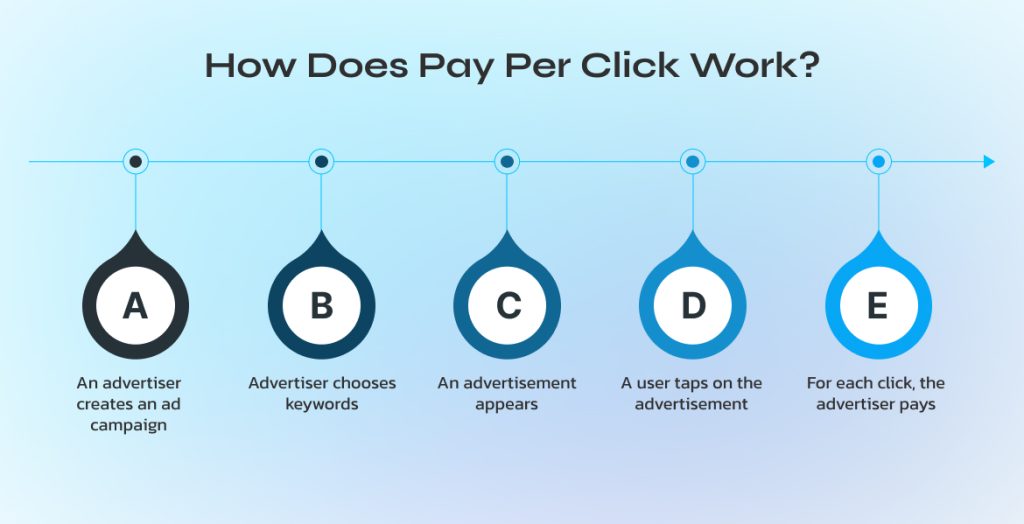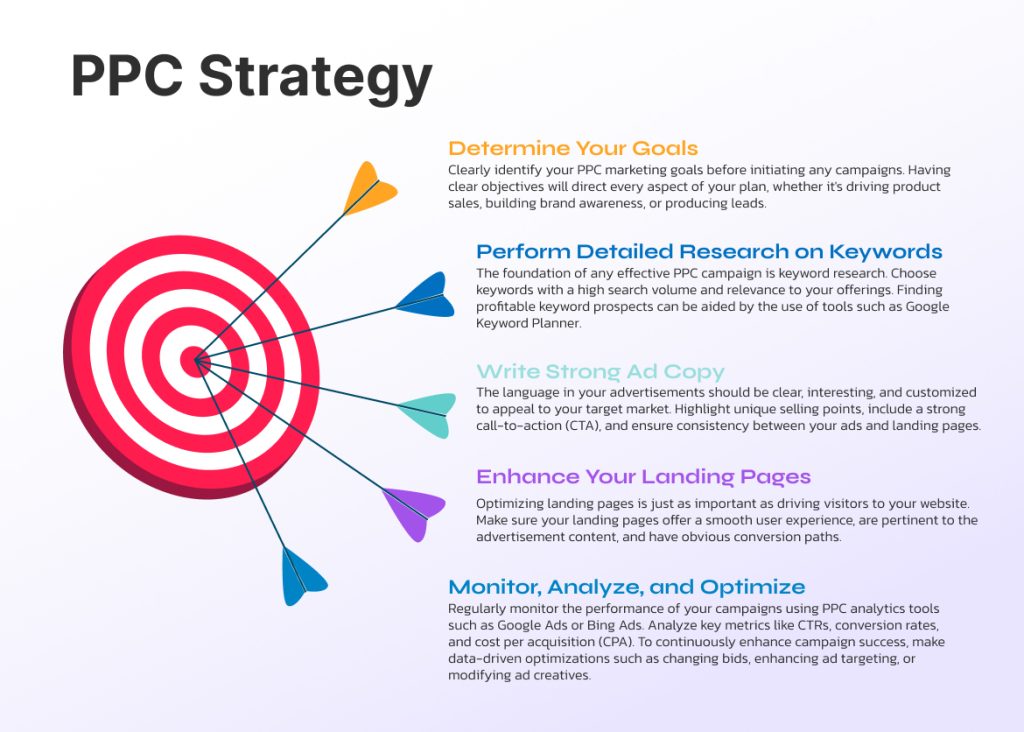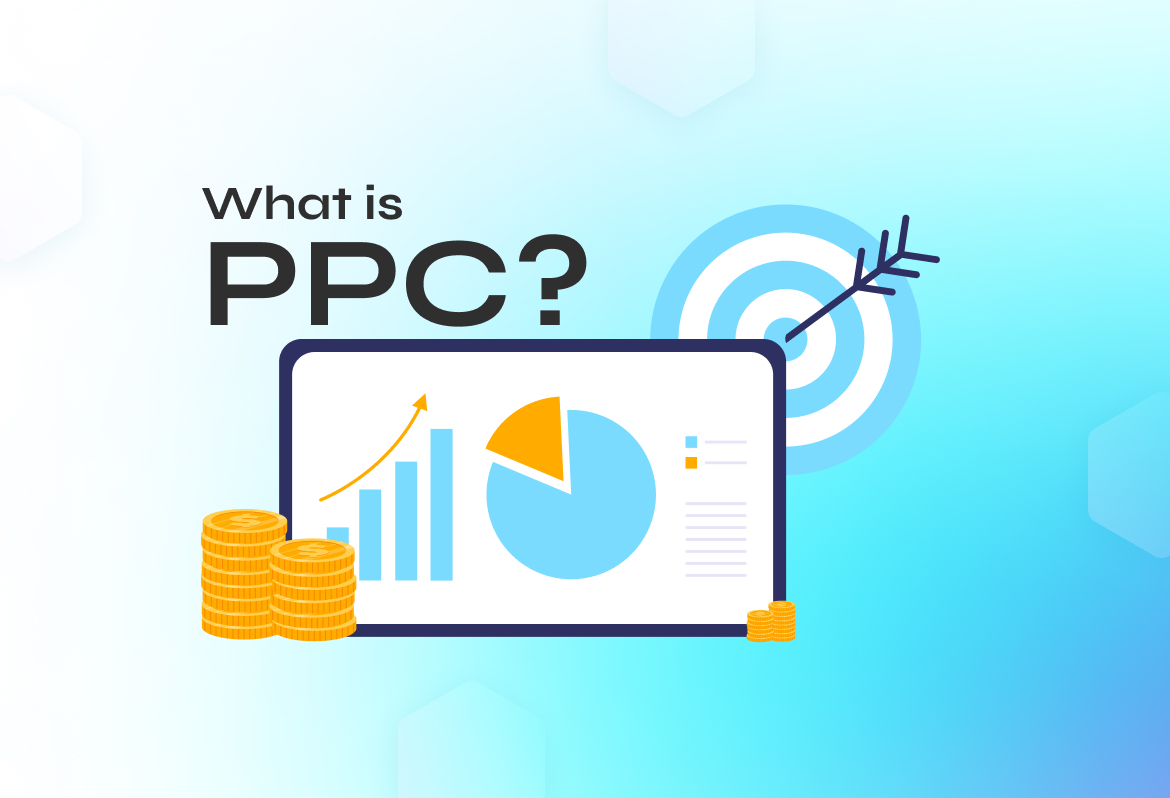Businesses are always looking for new and creative ways to connect with their target audience and increase conversions in the digital world of today. One such method that has gained immense popularity is Pay-Per-Click (PPC) marketing.
If you’re new to the world of digital marketing or don’t know what is PPC in digital marketing or have heard about PPC but aren’t quite sure what it entails, you’ve come to the right place. In this blog post, we will delve into the basics of PPC marketing, exploring its definition, benefits, strategies, and how it can help your business thrive in the online space.
What Exactly is PPC in Digital Marketing?
PPC advertising is essentially a kind of payment whereby advertisers are charged a fee each time one of their ads is clicked. Instead of trying to obtain such visitors naturally, you may use it to purchase visits to your website. One of the most popular types of PPC marketing is search engine advertising, and Google Ads is a well-known platform for managing these campaigns.
PPC is a popular form of digital marketing because it offers immediate results and the ability to target specific demographics. To make sure the correct people see their ads, advertisers can choose keywords or audience targeting options and set a budget for their PPC campaigns. In addition to raising conversion rates, this helps firms economize by only having to pay for potential consumers’ clicks. So, PPC is a modern form of digital advertising.
Basics of PPC Marketing
PPC marketing’s fundamentals include making and posting pertinent advertisements on websites, social media networks, and search engines. These ads typically appear on top of or alongside organic search results.
With PPC marketing, advertisers can place bids on particular keywords associated with their brand, goods, or services. This implies that the advertisement will show up for the user when they search for those specific terms. The advertiser’s website will be displayed to the user upon clicking on the advertisement.
Because PPC advertisements are only displayed to users who are actively looking for content relating to the advertiser’s business, one of the key advantages of PPC marketing is its ability to drive targeted traffic to a website. Better ROI (return on investment) and a higher conversion rate may result from this.
How Does Pay Per Click Work?

To understand how PPC Marketing works, let’s break down the process step by step:
- An advertiser creates an ad campaign
In pay-per-click advertising, the advertiser starts by setting up a campaign on a platform of their choice, like Google Ads or Bing Ads. This include deciding on the target market, allocating funds, and crafting persuasive advertisement language. With the help of Google Adwords, you can give your advertising campaign a boost.
- Advertiser chooses keywords
Next, the advertiser must choose relevant keywords that will trigger their ad to appear when searched by users. Next, a system similar to an auction is used to bid on these terms.
- An advertisement appears
When a user searches for one of the chosen keywords, the ad is entered into an auction with other ads targeting the same keywords. The ad with the highest bid and quality score (determined by factors such as relevance and click-through rate) will appear at the top of search engine results pages (SERPs).
- A user taps on the advertisement
The advertiser’s website will be reached if a user decides to click on the advertisement because it seems relevant to them.
- For each click, the advertiser pays
The advertiser gets charged a fixed amount based on their bid for that keyword each time a user clicks on one of their ads.
- Ad performance is tracked and optimized.
The PPC platform tracks the performance of each ad, including click-through rate (CTR) and conversion rate. Using this information, the campaign is optimized to generate better results by modifying the ad wording, targeting, and bidding.
In general, pay-per-click advertising enables companies to reach their desired audience by using certain keywords and just having to pay for the clicks that result. It is an effective way for businesses to drive traffic to their website and can be a cost-effective advertising method when managed properly. So, it is important for businesses to continuously monitor and optimize their PPC campaigns to ensure they are getting the most out of their investment.
Importance of PPC in Digital Marketing Trends
PPC advertising has greatly impacted the world of e-commerce. As it refers to a model of online advertising where advertisers pay a fee each time their ad is clicked, this form of paid advertisement allows businesses to bid for top ad placement on search engine results pages and other relevant websites, essentially buying visits to their site rather than earning them organically.
PPC plays a vital role in the flexibility and control of marketing campaigns. PPC platforms give marketers extensive control over their marketing initiatives. Marketers can set budgets, bid amounts, and targeting parameters to align with their marketing goals and strategies. The flexibility to make real-time adjustments allows for quick optimization in response to changing market conditions or business priorities.
PPC systems are always changing and incorporating new technology, such machine learning and artificial intelligence (AI). These advancements enable more sophisticated targeting, ad personalization, and automated optimization. Staying updated with these innovations allows businesses to leverage the latest features for improved campaign performance.
Advantages of Using PPC Marketing Strategy
PPC marketing offers numerous advantages that make it an enticing option for businesses looking to boost their online presence and achieve tangible results. Let’s explore some of the main advantages in more detail:
1: Instant Visibility and Outcomes
PPC offers immediate visibility in search engine results pages (SERPs), in contrast to other digital marketing channels that take time and work to establish traction. Your advertising might start to show up before prospective clients who are actively looking for products or services similar to yours as soon as your campaign launches. This means you can start driving relevant traffic and generating leads from day one.
2: Targeted Approach
The ability of PPC to target particular audiences based on variables like demographics, location, interests, and even the type of gadget is one of its biggest advantages. By limiting the audience to individuals who fit your desired consumer profile, this degree of specificity increases the possibility that users will convert. The studies of PPC Statistics of 2023 show that 75% of the users click on these ads. and find authentic and relevant information.
3: Cost Control
PPC advertising lets you control your spending and set a budget, in contrast to traditional approaches where you pay a flat charge regardless of the results. You possess the adaptability to distribute funds according to your marketing goals and alter them as necessary. In addition, it’s an inexpensive marketing tactic because you only have to pay when a user clicks on your advertisement.
4: Amplifies Efforts in SEO
While PPC operates separately from organic search engine optimization (SEO), running PPC campaigns can complement your SEO efforts in several ways. First off, it lets you focus on highly intended keywords that might take more time to appear naturally. Secondly, the data obtained from PPC campaigns can inform your overall SEO strategy by identifying top-performing keywords and optimizing website content accordingly.
How to Develop a Successful PPC Strategy?

To make the most out of your PPC campaigns, it’s crucial to develop a well-thought-out strategy tailored to your business goals and target audience. Here are some important factors to think about:
- Determine Your Goals
Clearly identify your PPC marketing goals before initiating any campaigns. Having clear objectives will direct every aspect of your plan, whether it’s driving product sales, building brand awareness, or producing leads.
- Perform Detailed Research on Keywords
The foundation of any effective PPC campaign is keyword research. Choose keywords with a high search volume and relevance to your offerings. Finding profitable keyword prospects can be aided by the use of tools such as Google Keyword Planner.
- Write Strong Ad Copy
The language in your advertisements should be clear, interesting, and customized to appeal to your target market. Highlight unique selling points, include a strong call-to-action (CTA), and ensure consistency between your ads and landing pages.
- Enhance Your Landing Pages
Optimizing landing pages is just as important as driving visitors to your website. Make sure your landing pages offer a smooth user experience, are pertinent to the advertisement content, and have obvious conversion paths.
- Monitor, Analyze, and Optimize
Regularly monitor the performance of your campaigns using PPC analytics tools such as Google Ads or Bing Ads. Analyze key metrics like CTRs, conversion rates, and cost per acquisition (CPA). To continuously enhance campaign success, make data-driven optimizations such as changing bids, enhancing ad targeting, or modifying ad creatives.
By implementing these strategies and continuously refining your approach based on insights gained from data analysis, you can maximize the benefits of PPC marketing for your business.
FAQs
What is online PPC advertising?
Digital marketers that utilize PPC (Pay-Per-Click) advertising pay each time a user clicks on their advertisement. Search engine marketing or sponsored search are other names for it.
What is the process of PPC digital marketing?
Relevant advertisements appear alongside the organic search results when a user enters a certain keyword or phrase into a search engine. Advertisers bid on keywords and phrases that they want to target, and their ad is placed in the top positions based on their bid amount and ad quality.
What kinds of PPC digital marketing are there?
- PPC digital marketing comes in a variety of forms, including:
- Search engines such as Google, Bing, and Yahoo! offer search advertising.
- Display advertising on websites that display ads from networks like Google AdSense.
- Social media marketing using sites like LinkedIn, Facebook, and Instagram.
- Remarketing or retargeting Ads that target people who have already interacted with your website or advertisement
Is PPC digital marketing suitable for all businesses?
While PPC digital marketing can be beneficial for many businesses, it may not be the best fit for every business. It is important to assess your goals, target audience, and budget before deciding if PPC digital marketing is the right strategy for your business.
How can I design an effective PPC online advertising campaign?
Make sure you target relevant and high-performing keywords by conducting in-depth keyword research before launching a PPC digital marketing campaign. Write enticing ad copy to get people to click on it. Create well-designed landing pages that align with your ad and provide a clear call-to-action for users. Continuously monitor and optimize your campaign based on data and insights.
Can I do PPC digital marketing myself, or should I hire a professional?
You can certainly learn how to do PPC digital marketing yourself, but it does require a significant amount of time, effort, and knowledge to create and manage successful campaigns. Hiring a professional or agency with experience in PPC digital marketing can save you time and potentially yield better results. In the end, though, everything comes down to your resources and budget.
What is the approximate price of PPC digital marketing?
The cost of PPC digital marketing varies depending on factors such as the platform, competition for keywords, and your specific campaign goals. For your campaign, you can generally set a daily or monthly budget and make adjustments as needed. To assess the total cost-effectiveness of your PPC digital marketing campaigns, it’s critical to monitor their return on investment (ROI).
Conclusion
In a nutshell, PPC marketing has a number of benefits that might help your company succeeds online. It provides immediate visibility, precise targeting capabilities, cost control measures, measurable results, and synergistic benefits with SEO efforts. By formulating a well-crafted strategy that aligns with your objectives and audience needs while continuously monitoring performance metrics for optimization opportunities, you can unlock the full potential of PPC marketing to drive growth for your business in today’s competitive online landscape.


